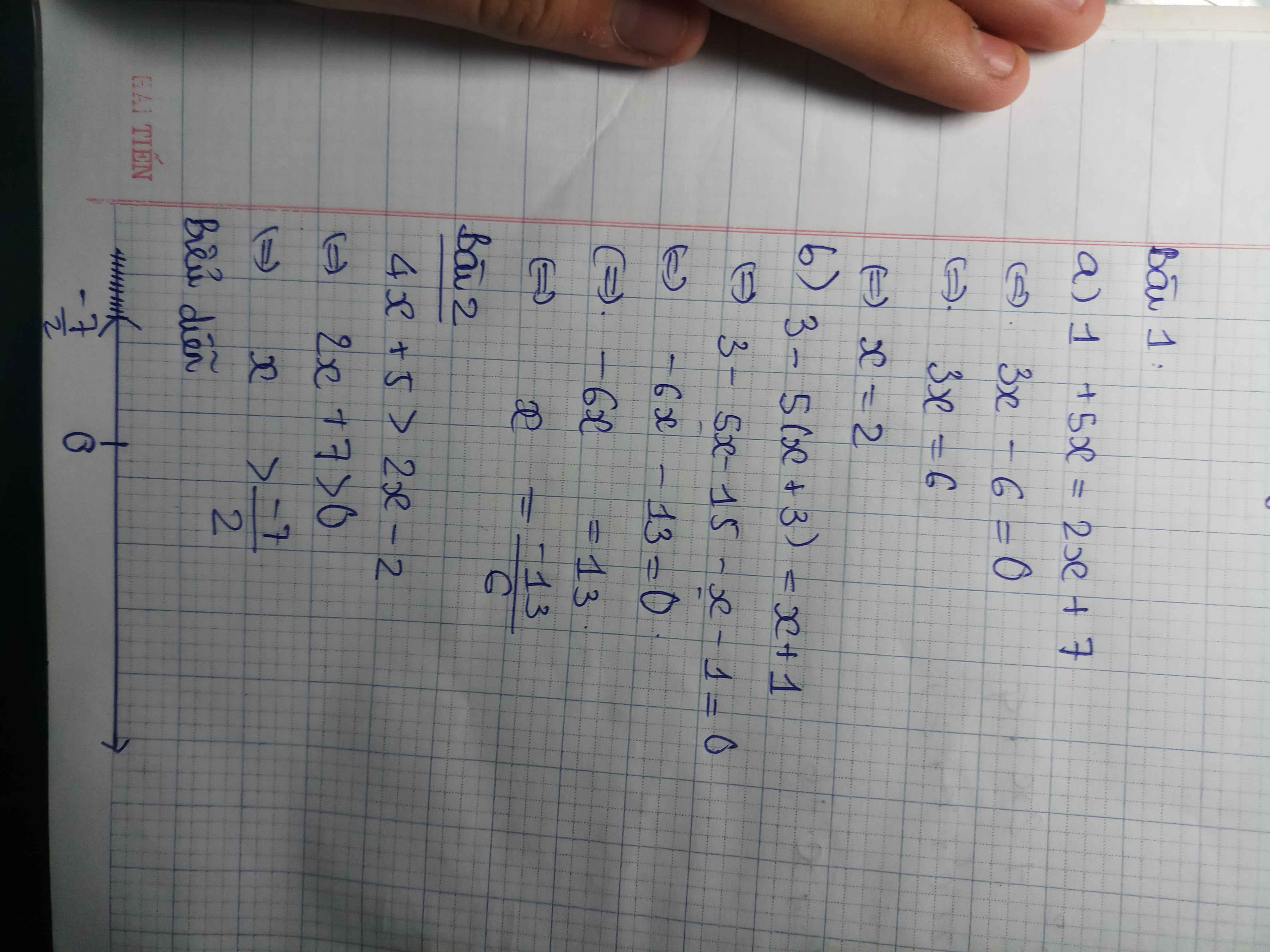Bài 7 : Giải phương trình a, √2x + 1 = 2x + 1 b, √x + 1= 2x + 1
Hãy nhập câu hỏi của bạn vào đây, nếu là tài khoản VIP, bạn sẽ được ưu tiên trả lời.


Mình khuyên bạn thế này :
Bạn nên tách những câu hỏi ra
Như vậy các bạn sẽ dễ giúp
Và cũng có nhiều bạn giúp hơn !
Bài 1.
a) ( x - 3 )( x + 7 ) = 0
<=> x - 3 = 0 hoặc x + 7 = 0
<=> x = 3 hoặc x = -7
Vậy S = { 3 ; -7 }
b) ( x - 2 )2 + ( x - 2 )( x - 3 ) = 0
<=> ( x - 2 )( x - 2 + x - 3 ) = 0
<=> ( x - 2 )( 2x - 5 ) = 0
<=> x - 2 = 0 hoặc 2x - 5 = 0
<=> x = 2 hoặc x = 5/2
Vậy S = { 2 ; 5/2 }
c) x2 - 5x + 6 = 0
<=> x2 - 2x - 3x + 6 = 0
<=> x( x - 2 ) - 3( x - 2 ) = 0
<=> ( x - 2 )( x - 3 ) = 0
<=> x - 2 = 0 hoặc x - 3 = 0
<=> x = 2 hoặc x = 3

a: =>-x+2x=3-7
=>x=-4
b: =>6x+2+2x-5=0
=>8x-3=0
hay x=3/8
c: =>5x+2x-2-4x-7=0
=>3x-9=0
hay x=3
d: =>10x2-10x2-15x=15
=>-15x=15
hay x=-1

a: =>(x-3)(x+1)=0
=>x=3 hoặc x=-1
b: =>x(x-3)=0
=>x=0 hoặc x=3
c: =>(x-5)(x+1)=0
=>x=5 hoặc x=-1
d: =>5x^2+7x-5x-7=0
=>(5x+7)(x-1)=0
=>x=1 hoặc x=-7/5
e: =>x^2-4=0
=>x=2 hoặc x=-4
h: =>x^2-4x+4-3=0
=>(x-2)^2=3
=>\(x=2\pm\sqrt{3}\)

bạn đăng tách cho mn cùng giúp nhé
Bài 1 :
a, \(\Leftrightarrow11-x=12-8x\Leftrightarrow7x=1\Leftrightarrow x=\dfrac{1}{7}\)
b, \(\Leftrightarrow2x\left(x^2+4x+4\right)-8x^2=2\left(x^3-8\right)\)
\(\Leftrightarrow2x^3+8x^2+8x-8x^2=2x^3-16\Leftrightarrow x=-2\)
c, \(\Leftrightarrow3-2x=-x-4\Leftrightarrow x=7\)
d, \(\Leftrightarrow x^3-6x^2+12x-8+9x^2-1=x^3+3x^2+3x+1\)
\(\Leftrightarrow3x^2+12x-9=3x^2+3x+1\Leftrightarrow x=\dfrac{10}{9}\)
e, \(\Leftrightarrow2x^2-x-3=2x^2+9x-5\Leftrightarrow x=5\)
f, \(\Leftrightarrow x^3-3x^2+3x-1-x^3-2x^2-x=10x-5x^2-11x-22\)
\(\Leftrightarrow-5x^2+2x-1=-5x^2-x-22\Leftrightarrow3x=-21\Leftrightarrow x=-7\)


a, \(\left(x^2-5x+7\right)^2-\left(2x-5\right)^2=0\)
\(\Leftrightarrow\left(x^2-5x+7-2x+5\right)\left(x^2-5x+7+2x-5\right)=0\)
\(\Leftrightarrow\left(x^2-7x+12\right)\left(x^2-3x+2\right)=0\)
\(\Leftrightarrow\left(x-4\right)\left(x-3\right)\left(x-1\right)\left(x-2\right)=0\Leftrightarrow x=1;x=2;x=3;x=4\)
Vậy tập nghiệm phương trình là S = { 1 ; 2 ; 3 ; 4 }
b, \(\left|2x-1\right|=5\Leftrightarrow\left[{}\begin{matrix}2x-1=5\\2x-1=-5\end{matrix}\right.\Leftrightarrow\left[{}\begin{matrix}x=3\\x=-2\end{matrix}\right.\)
Vậy tập nghiệm của phương trình là S = { -2 ; 3 }
c, \(\left|2x-1\right|=\left|x+5\right|\Leftrightarrow\left(2x-1\right)^2=\left(x+5\right)^2\)
\(\Leftrightarrow\left(2x-1\right)^2-\left(x+5\right)^2=0\Leftrightarrow\left(2x-1-x-5\right)\left(2x-1+x+5\right)=0\Leftrightarrow x=6;x=-\dfrac{4}{3}\)
Vậy tập nghiệm của phương trình là S = { -4/3 ; 6 }
d, \(\left|3x+1\right|=x-2\)
TH1 : \(3x+1=x-2\Leftrightarrow2x=-3\Leftrightarrow x=-\dfrac{3}{2}\)
TH2 : \(3x+1=-x+2\Leftrightarrow4x=1\Leftrightarrow x=\dfrac{1}{4}\)
Vậy tập nghiệm của phương trình là S = { -3/2 ; 1/4 }
các ý còn lại tương tự
a) Ta có: \(\left(x^2-5x+7\right)^2-\left(2x-5\right)^2=0\)
\(\Leftrightarrow\left(x^2-5x+7-2x+5\right)\left(x^2-5x+7+2x-5\right)=0\)
\(\Leftrightarrow\left(x^2-7x+12\right)\left(x^2-3x+2\right)=0\)
\(\Leftrightarrow\left(x-3\right)\left(x-4\right)\left(x-1\right)\left(x-2\right)=0\)
\(\Leftrightarrow\left[{}\begin{matrix}x-3=0\\x-4=0\\x-1=0\\x-2=0\end{matrix}\right.\Leftrightarrow\left[{}\begin{matrix}x=3\\x=4\\x=1\\x=2\end{matrix}\right.\)
Vậy: S={3;4;1;2}

Bài 1:
a) (5x-4)(4x+6)=0
\(\Leftrightarrow\orbr{\begin{cases}5x-4=0\\4x+6=0\end{cases}\Leftrightarrow\orbr{\begin{cases}5x=4\\4x=-6\end{cases}\Leftrightarrow}\orbr{\begin{cases}x=\frac{4}{5}\\y=\frac{-3}{2}\end{cases}}}\)
b) (x-5)(3-2x)(3x+4)=0
<=> x-5=0 hoặc 3-2x=0 hoặc 3x+4=0
<=> x=5 hoặc x=\(\frac{3}{2}\)hoặc x=\(\frac{-4}{3}\)
c) (2x+1)(x2+2)=0
=> 2x+1=0 (vì x2+2>0)
=> x=\(\frac{-1}{2}\)
bài 1:
a) (5x - 4)(4x + 6) = 0
<=> 5x - 4 = 0 hoặc 4x + 6 = 0
<=> 5x = 0 + 4 hoặc 4x = 0 - 6
<=> 5x = 4 hoặc 4x = -6
<=> x = 4/5 hoặc x = -6/4 = -3/2
b) (x - 5)(3 - 2x)(3x + 4) = 0
<=> x - 5 = 0 hoặc 3 - 2x = 0 hoặc 3x + 4 = 0
<=> x = 0 + 5 hoặc -2x = 0 - 3 hoặc 3x = 0 - 4
<=> x = 5 hoặc -2x = -3 hoặc 3x = -4
<=> x = 5 hoặc x = 3/2 hoặc x = 4/3
c) (2x + 1)(x^2 + 2) = 0
vì x^2 + 2 > 0 nên:
<=> 2x + 1 = 0
<=> 2x = 0 - 1
<=> 2x = -1
<=> x = -1/2
bài 2:
a) (2x + 7)^2 = 9(x + 2)^2
<=> 4x^2 + 28x + 49 = 9x^2 + 36x + 36
<=> 4x^2 + 28x + 49 - 9x^2 - 36x - 36 = 0
<=> -5x^2 - 8x + 13 = 0
<=> (-5x - 13)(x - 1) = 0
<=> 5x + 13 = 0 hoặc x - 1 = 0
<=> 5x = 0 - 13 hoặc x = 0 + 1
<=> 5x = -13 hoặc x = 1
<=> x = -13/5 hoặc x = 1
b) (x^2 - 1)(x + 2)(x - 3) = (x - 1)(x^2 - 4)(x + 5)
<=> x^4 - x^3 - 7x^2 + x + 6 = x^4 + 4x^3 - 9x^2 - 16x + 20
<=> x^4 - x^3 - 7x^2 + x + 6 - x^4 - 4x^3 + 9x^2 + 16x - 20 = 0
<=> -5x^3 - 2x^2 + 17x - 14 = 0
<=> (-x + 1)(x + 2)(5x - 7) = 0
<=> x - 1 = 0 hoặc x + 2 = 0 hoặc 5x - 7 = 0
<=> x = 0 + 1 hoặc x = 0 - 2 hoặc 5x = 0 + 7
<=> x = 1 hoặc x = -2 hoặc 5x = 7
<=> x = 1 hoặc x = -2 hoặc x = 7/5

Giải giúp em với
\(a,ĐK:x\ge-\dfrac{1}{2}\\ PT\Leftrightarrow\sqrt{2x+1}\left(\sqrt{2x+1}-1\right)=0\\ \Leftrightarrow\left\{{}\begin{matrix}2x+1=0\\2x+1=1\end{matrix}\right.\Leftrightarrow\left\{{}\begin{matrix}x=-\dfrac{1}{2}\left(tm\right)\\x=0\left(tm\right)\end{matrix}\right.\\ b,ĐK:x\ge-\dfrac{1}{2}\\ PT\Leftrightarrow x+1=4x^2+4x+1\\ \Leftrightarrow4x^2+3x=0\Leftrightarrow x\left(4x+3\right)=0\\ \Leftrightarrow\left[{}\begin{matrix}x=0\left(tm\right)\\x=-\dfrac{3}{4}\left(ktm\right)\end{matrix}\right.\Leftrightarrow x=0\)